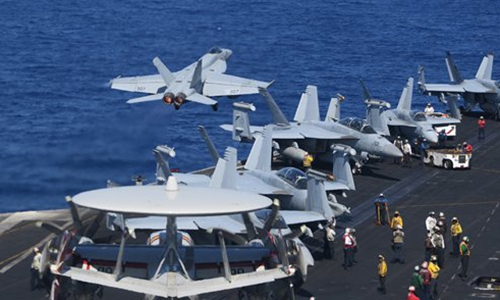US military to escalate provocations against China post-pandemic despite viral vulnerability
By Song Zhongping Source:Global Times Published: 2020/5/2 20:03:40

A US FA-18 Hornet fighter jet flies past fighter jets and E-2C Hawkeyes during a routine training aboard US aircraft carrier Theodore Roosevelt in the South China Sea on March 31. Photo: AFP
Global military spending grew at the fastest pace in a decade in 2019, but "the economic crisis resulting from the COVID-19 pandemic will probably disrupt future military spending," according to a report published on April 27 by think tank Stockholm International Peace Research Institute.As the global economy slumps and debt piles up, many are worried defense budgets will shrink. However, in the long run, the US military, already battered by the outbreak, will continue to be unabated in both military costs and efforts to provoke China.
With warship coronavirus infections rising and successive confirmed cases revealed on the USS Carl Vinson, USS Theodore Roosevelt, USS Ronald Reagan and USS Nimitz, concerns over US military readiness spiral. It brought the US Navy Indo-Pacific command to a critical moment as all of their four aircraft carriers deployed in these waters have been infected, alongside another amphibious assault ships such as the USS Boxer which also reported new positive cases.
Once multiple US aircraft carriers lose abilities in keeping regular combat readiness, a military vacuum in the Indo-Pacific waters is very likely to appear that will undoubtedly threaten US long-established naval hegemony.
Who would have thought that US modern aircraft carriers marked as strong defenders for nuclear, chemical, and biological attacks would be completely defeated by a novel coronavirus?
In the short term, the US military may be hunkering down for COVID-19 as its combat effectiveness has indeed been weakened. The US Department of Defense (DoD) has enacted a 60-day stop movement order for all DoD uniformed and civilian personnel and their sponsored family members overseas in a bid to further control the spread of COVID-19.
However, COVID-19 will not prompt the US to trim its defense budgets despite the domestic economic crisis. On the contrary, the greater the perceived threat is, the more the US military expenditure will be for advanced equipment and more munitions to cope with future risks of biological attacks.
The US will skew military investment to research and deployment of unmanned vehicles and AI military technologies afterward as the outbreak of coronavirus warns US forces how they were fragile and unprepared in non-war operations. This includes responding to the pandemic, especially in comparison with the Chinese People's Liberation of Army which has rich experience in fighting disasters and epidemics.
This vulnerability is also a consequence of its worldwide meddling in the quest for global hegemony. The US military warships are a "floating US land." It will dock and rest at various ports around the world, which virtually increases the risk of virus transmission, in addition to the problems of fatigue, crowding, and poor sanitation on military bases. The US military will speed up the repair of its own military governance loopholes, tighten its discipline, and make up for its shortcomings.
The US frequent visits of surveillance planes and bombers to the South China Sea showcase its nervousness of China - the US top one "imaginary enemy" - to take over its military vacuum in the Indo-Pacific area.
The US military force has stepped up its surveillance efforts to understand the military dynamics of its imaginary opponents, and provide strategic intelligence support for its own military recovery. US armed forces usually spy on what they fear to lose, especially when they think of their traditional influence as being shaken.
In the long run, the US military's ambition to be the maritime power will collapse under its own belligerent policies. As long as the epidemic comes under control, US provocations against China in the South China Sea and the Taiwan Straits will resurge.
The worsening relationship between China and the US during the pandemic prompted the US to be even more aware of China as its most important maritime rival, and such antagonism will be exacerbated in the post-pandemic era.
The author is a military expert and TV commentator. opinion@globaltimes.com.cn
Posted in: VIEWPOINT